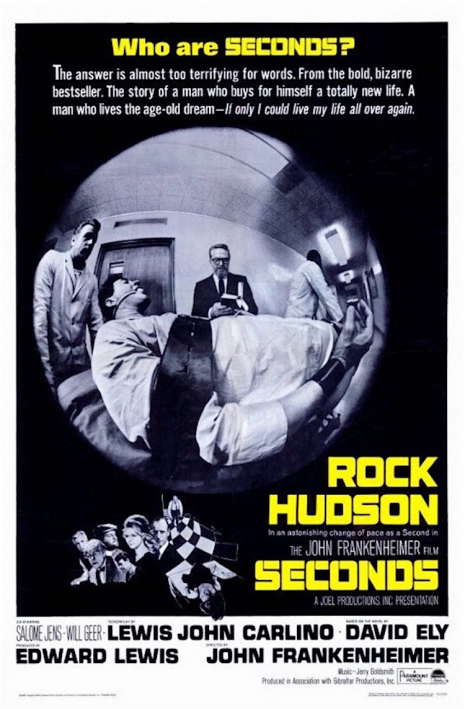
Rock Hudson was killing time waiting for that one big role to come along to change it all. He was making money, sure, lotsa money, he was box office mint but he was just doing the same damned thing over and over and over again. The hopes he once harbored after his performances in Giant or Written in the Wind or even The Spiral Road (a role he claimed to have studied the bejesus for) had all come to nought. Zip. Nada. No one was giving him a chance least of all his agent and long-time pal Henry Willson.
Willson was doing sweetheart deals with the studios. A stash of cash under the table to get Hudson signed-up for another goddamn contract. Five more movies, sure, Rock would love to do them…where do ya want me to sign? Hudson was Wilson’s money-maker. He pimped him out to whoever had the most moolah. Wilson felt justified in his actions. He had been the one who’d picked up the six-foot-four beefcake when he was a long-streak of piss truck-driver fresh outta Winnetka. Willson pushed Hudson on the casting circuit and got him a deal when he still couldn’t get his lines right or even make an entrance without tripping over the props. Willson had also christened him Rock (after the Rock of Gibraltar) and Hudson (after the river) and made him into America’s number one heart-throb who made teenage girls swoon and their moms all dreamy-eyed. Wilson was taking what he thought was rightfully his—money. Which meant no big dramatic roles came Hudson’s way after Giant or The Spiral Road because there was no money and no interest there. All he got was rom-coms with thirty-something girl-next-door Doris Day or sexy swing-hips Gina Lollobrigida.
Hudson’s relationship with Willson was complex. It was a business partnership with benefits. Both men were gay and Wilson had the hots for Hudson and acted on it. To make matters more Freudian, the older Willson was also a father-figure to Hudson. A replacement for the father who had abandoned Rock when he was about three. Hudson always felt he was responsible for his father’s departure, which of course wasn’t true. Eventually, his mother remarried and his new stepdad was a drunk, a coward, and a bully who beat the shit outta Hudson just because he could.
Hudson was about nine-years-old at the time. He quickly learned how to hide his feelings, how to make his face a mask, and keep his thoughts to himself.
When Hudson grew like Topsy, he was able to hit back. That put paid to the ole drunk stepdad’s violence. In the same way when Hudson became a big movie star, he didn’t need Wilson no more. The roles he sought hadn’t materialised and he no longer wanted Willson signing his life away so he could line his pockets while Hudson did all the work. Hudson fired Willson. Now he was gonna make his own decisions.
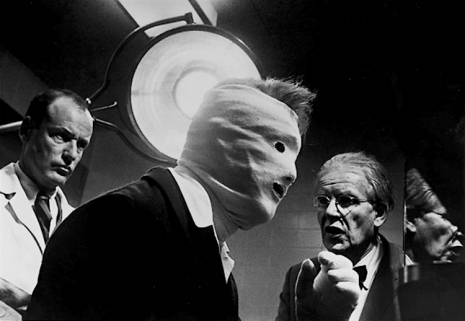
Hudson decided on making a movie that would be so different, so far removed from his usual jokey isn’t-this-fun fare, that he hoped it would make audiences and producers appreciate his talents as an actor and not his hunky good looks. His decision turned out to be a kinda Pyrrhic victory. Hudson got the part he had always wanted but the movie bombed and killed-off his ambitions to ever try something like this again.
The movie was Seconds.
Based on a novella by (the vastly underrated) David Ely, Seconds tells the story of Antiochus Wilson (Arthur Hamilton in the film), a bored frustrated deadbeat middle-aged banker who feels his life is over until one day he is offered a second chance by a dark mysterious secret organization. For the right amount of money, this organization will give Wilson a new face, a new identity, a whole new life which he can keep so long as he plays by their rules.
Kirk Douglas had originally optioned the book thinking here was a sure-fire Best Actor Oscar if he played both the before and after roles of Hamilton/Wilson. Unfortunately, when the green light came, Douglas was busy making other plans. The rights were then bought by Paramount for their young director John Frankenheimer who’d earned his spurs and made the studio mega-bucks with a series of box hits—Birdman of Alcatraz (1962), The Manchurian Candidate (1962), Seven Days in May (1964), and The Train (1965). In Hollywood, you’re only as good as your last movie. Frankenheimer was yet to have a flop. This meant he could do what the hell he liked.
Frankenheimer thought the only actor who could play the before and after roles of Hamilton/Wilson was Laurence Olivier. He hopped on a plane to England and got the theatrical knight to agree to the role. But this wasn’t what Paramount wanted. They wanted a BIG NAME. A BIG BOX-OFFICE NAME that would bring as wide and as varied an audience to the movie as possible and therefore lotsa money. Through a friend-of-a-friend-of-a-friend, Rock Hudson was suggested as a possible lead to Frankenheimer. The director couldn’t see it but agreed to meet with the actor.
Hudson wanted the part but he knew his limitations. He suggested to Frankenheimer that two actors should play the before and after roles rather than just one. It was a clever idea—one Frankenheimer thought would work. Hudson inferred he wanted the role because he knew exactly what it was like to be Hamilton/Wilson. Here was an actor who been forced to hide his true feelings since childhood and had had a whole new (fake) identity as America’s red-blooded hetero-beefcake foisted on him by movie studios. All because he wanted to have the one career he had always dreamed about.
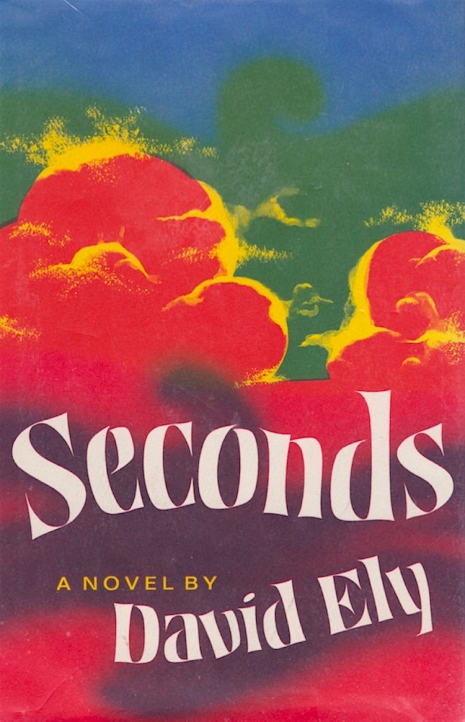
Frankenheimer cast John Randolph as the before middle-aged banker Hamilton. Randolph had been blackballed by Hollywood as a commie-sympathiser after taking the fifth in front of the House Un-American Activities Committee in 1955. Randolph’s movie career was over. Frankenheimer cast Randolph as a way of giving the bird to Hollywood and letting them know a new day was a-coming. He also hired Will Geer, another blackballed commie actor, whose career had been wrecked by HUAC after refusing to name persons who had joined the Communist Party.
Frankenheimer also chose Randolph because he was the actor the movie’s plastic surgeon tech. advisor suggested most resembled Hudson’s before look. Randolph was tasked with watching Hudson learning how he talked, walked, sat, slouched, and even smoked cigarettes—between his ring and middle finger. Hudson was also doing his own homework. Though he kept away from the set during Randolph’s scenes, he watched the rushes every night acquainting himself with how Randolph played the role of the banker. What mannerisms he had, how he moved his head, his body, and how he made the character of Hamilton come alive on screen.
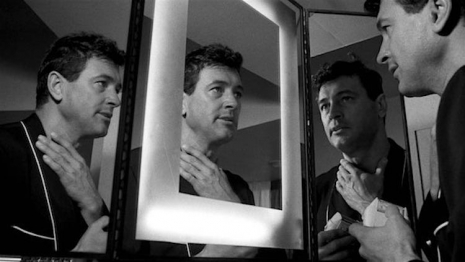
Hudson knew the role of Hamilton/Wilson was in many ways a parallel to his own life. This similarity became very apparent when Hudson filmed one sequence at a party where his character Wilson gets drunk and falls apart as the strain of living up to his new (fake) identity becomes waaaay too much. During the original take, Hudson went full Method, got exceedingly drunk and let everything out. He eventually collapsed into a sobbing fucked-up wreck. Frankenheimer stopped filming, emptied the set, and cradled Hudson in his arms until the actor regained control of himself.
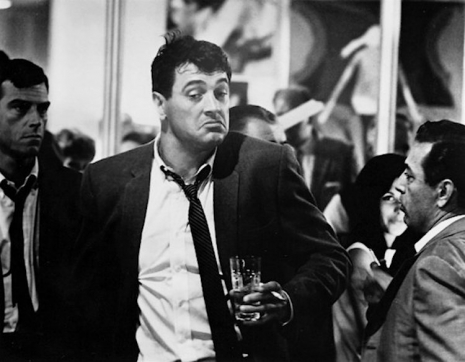
In another equally disturbing sequence, this time at a wine festival, Hudson and co-star Salome Jens were stripped and dunked or rather pushed and punched and stomped on by the over-enthusiastic revelers. Frankenheimer used non-actors and filmed the real event as if it were a documentary. Hudson was terrified, which is apparent on-screen, as he was being forced by these non-actors to abandon all of his learned defensive techniques and respond to the very real situation in a purely visceral way. At one point, Hudson was ducked into the wine and held under. Both actors were naked though these scenes were edited out—-which kinda undermines the sequence’s full disturbing potential.
But Hudson was determined to give his all for the movie to prove he had some real talent as an actor. To such an extent that in the final sequence, when he was strapped down and wheeled away on a gurney to meet his fate, he struggled with such ferocity and terror that he snapped one of the leather straps that bound his arms.
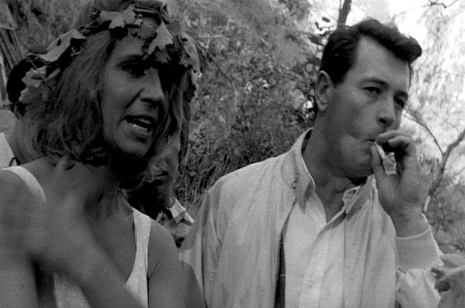
Rock Hudson never gave a better performance than he did in Seconds. It should have been the start of a new career, a greater more brilliant career as a serious dramatic actor. But the film was a flop. Critics hated it. The audiences hated it. It was too bleak, too dark, too fucking close to the bone to garner anything more than the public’s opprobrium.
The movie’s failure killed something in Hudson. With the exception of Pretty Maids All in a Row, when he played a serial killer, he never again tried to move out of the role Hollywood had forced on him. He was happy to take the paycheck and sleepwalk thru movies like Ice Station Zebra or TV series McMillan and Wife because that’s what the public and the producers wanted.
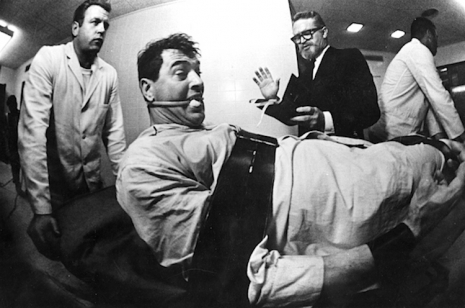
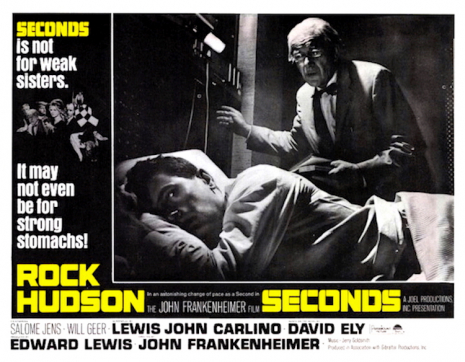
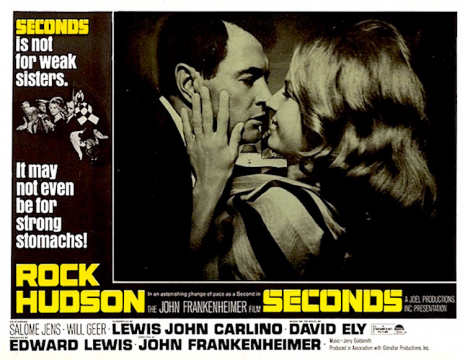
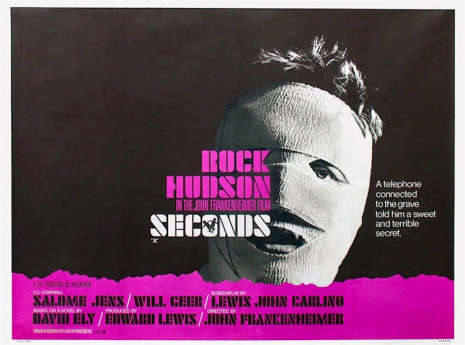
Pix via Filmint, Afflictor, and fffmovieposters.
Previously on Dangerous Minds:
WTF? Bea Arthur and Rock Hudson sing about coke, meth and weed
Great moments in queer cinema: James Dean attempting to punch Rock Hudson in the dick
Oliver Reed as a prototype Alex from ‘A Clockwork Orange’ in ‘These are the Damned’
Rebel Without Applause: That time Sir John Gielgud got busted for cruising